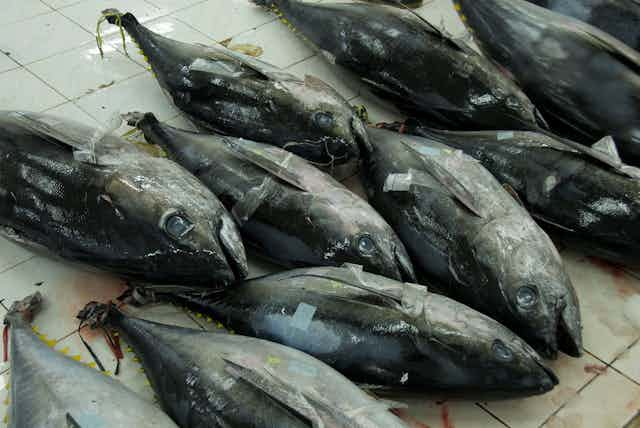The world catches too many tuna. Thanks to our high levels of fishing, some tuna species are under threat. Everyone involved in the fishing industry agrees that fishing effort needs to be reduced. But no one can decide who should bear the burden of cutting back their fishery. This week the Scientific Committee to the Western and Central Pacific Fisheries Commission (WCPFC) meets in Busan, Korea to try once more to reduce over-fishing.
The WCPFC is the globally mandated regional fisheries management organisation for these tuna fisheries. It is required to adopt conservation measures that ensure the long-term conservation of the region’s tuna fisheries. These measures are then legally binding on the WCPFC’s member States (including Australia).
The WCPFC faces a complex conservation and management challenge. Previous scientific assessments found that we need urgent action to address overfishing for some species of tuna. We must also develop precautionary limits for others. Otherwise, the world’s largest tuna fishery will decline in productivity and value, wasting a critically important resource and leading to key species becoming overfished. Such a management failure would first impact on the vulnerable bigeye tuna, then yellowfin and albacore, and lastly skipjack. Even the highly productive and resilient skipjack has sustainability limits.
The conservation challenge is complicated by the multi-gear, multi-species and trans-boundary characteristics of these tuna fisheries. Each species of tropical tuna is caught by each gear in a tightly inter-meshed manner that is difficult, if not impossible, to separate. It’s no one fishery’s problem; everyone has to work together.

The WCPFC has struggled to address this challenge since its was established in 2004. Every single session of the Scientific Committee has advised the WCPFC to reduce overfishing, and every meeting of the WCPFC has responded with measures that are insufficient to implement the scientific recommendations.
The key obstacle to adopting a sufficiently strong conservation measure is the difficult negotiation over how the burden of conservation is distributed. Given current levels of overfishing, some or all WCPFC member states must necessarily compromise their interests and carry some share of the conservation burden.
If serious conservation measures are introduced, it will affect some of the developing small-island states that depend significantly on tuna fisheries. Many of these states have strong aspirations to further develop fisheries’ benefits. Some of these states may have few other development and resource options: conservation could give them a relatively higher economic and social burden compared to other states with diverse resources, large institutions and substantial revenue streams from multiple economic activities.

Under international law, the WCPFC has to make sure that conservation measures do not transfer a disproportionate burden of conservation action on to developing states. But the WCPFC does not transparently study how each of its potential management options would distribute the conservation burden.
Instead, the WCPFC addresses deeply political and economic arguments using a scientific framework. This framework then becomes politicised: members favour scientific assessments for measures that best protect their own interests, and refute scientific assessments when they compromise their interests.
Ultimately, the lack of a framework to address political and equity considerations undermines the fisheries science, while still leaving the political and economic questions unanswered.
The WCPFC should adopt a new approach to distributing the conservation. It should transparently answer the important equity questions that are fundamental to conservation negotiations. This new system would provide concrete steps that explicitly determine what conservation burden each state would carry depending on their national characteristics. This would modernise fisheries management, making it more consistent with broader developments in common resource management. We can see this approach now in climate change negotiations, where there are principles of differentiated responsibilities between developed and developing states.
Let’s look at an example: how do we decide how to reduce catches? Should a historically high level of catch and fishing activity be prioritised? Or should it be penalised, if it is considered more equitable to share benefits in turn? Should the WCPFC incorporate the principle of “polluter pays” into fisheries measures, and focus the conservation burden on those states who are historically responsible for overfishing?

The new approach would address such questions. The WPCFC would identify the key fields of interest (say, rights to fishing grounds) that may be impacted by conservation measures. It would then develop a methodology to distribute the conservation burden, based on specific values for each field of interest. This would then measure the impact of these alternative management options against the identified fields and their agreed values, and determine which of the management options generated the least impact.
This approach would separate the scientific advice from the distribution of the conservation burden, de-politicising the scientific assessments and advice to a significant degree. Members could feel sure their interests would be transparently and equitably considered in accordance with the agreed framework. They would be able to see how decisions were made.
Similar discussions have occured in climate change negotiations with support for transparent application of conservation measures and differentiated responsibilities for conservation between developed and developing States. As is the case in climate change negotiations, it is likely that such concepts will prove contentious in fisheries management. But until something changes, the current status quo will continue: fisheries will become overfished, industries will decline, our oceans will become poorer and developing states will lose a rare opportunity to develop economic independence.

